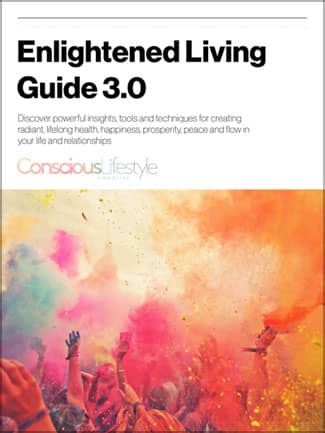No Expectations, No Disappointments:
How to Live From a Place of Infinite Possibility
BY CHRISTINE HASSLER
 When you have no expectations, you have no disappointments and you open yourself to the realm of infinite possibility, where happiness and abundance simply fall into your lap. photo: martin sattler
When you have no expectations, you have no disappointments and you open yourself to the realm of infinite possibility, where happiness and abundance simply fall into your lap. photo: martin sattler
We are all consumers of expectations. They are easy to come by—from parents, family, friends, the media—and many are self-created. Maybe it’s to be successful, get married, have children, look good, make a
difference, please others…The list is endless, especially in today’s world, where there are constant opportunities to compare ourselves to others and look for ways to be more, better, or different. Never before have expectations been so high in terms of what humans are capable of, and this creates a paradox of opportunity and pressure when we begin to realize that expectations lead to disappointments.Expectations are pervasive in our lives, and most of us are conditioned to be driven by them and to attempt to realize them. But we didn’t start out that way. We are all born in a state of pure Love where there are absolutely no expectations and no disappointments. Think of it as our “original innocence.” When you were born, you knew these Truths: You are whole and complete. There is absolutely nothing wrong with you. You are worthy and deserving. You can trust the Universe. You have a deep inner knowing. You are connected. All there is and all that matters is Love. You are Love.
And then you got older. And things happened that moved you out of love and into fear: someone criticized you; you only got praised for your accomplishments; someone left or wasn’t there for you; you saw people fighting or got yelled at; your heart got broken; you were told your dreams were impossible; you felt incredible pressure to succeed; you got rejected; you made a mistake and judged yourself a failure; you compared yourself to others and believed they were better in some way. Or perhaps you had a blissful childhood and grew up expecting the adult world to be the same way. The moment you got your first reality check in the form of a disappointment was the moment you moved into fear. Expectations lead to disappointment, and you were just getting your first taste.
When in the grip of fear, we experience disconnection and a sense of emptiness. The voice of our ego and the voices of others become much louder than our inner voice and Spirit, and we feel alone and separate. To manage the disconnection, we start to be driven by what we expect will make us feel loved again. To fill the emptiness, we create expectations of what we believe will fulfill us. As we fail to live with no expectations, they then become our compass, which often navigate us right into an Expectation Hangover.
“When one door closes, another door opens; but we so often look so long and so regretfully upon the closed door, that we do not see the ones which open for us.” —Alexander Graham Bell
“Expectation Hangover” Defined
You probably have a good sense of what an Expectation Hangover is by now, but here is my official definition: the myriad undesirable feelings, thoughts, and responses present when one or a combination of the following things occurs:
+ Things don’t turn out the way you thought, planned, or wanted them to.
+ Things do turn out according to your plans and desires, but you don’t feel the fulfillment you expected.
+ You are unable to meet your personal and/or professional expectations.
+ An undesired, unexpected event occurs that is in conflict with what you wanted or planned.
There are many different types of Expectation Hangover, but they usually fall into one of the following three categories:
Situational Expectation Hangovers. These occur when our expectations lead to disappointment as something does not turn out the way we wanted or we do not get the anticipated satisfaction from achieving a result. Michelle worked so hard to pursue a career in law, but it turned out to be nothing like she expected; she found herself dreading going to work each day. Jason spent over a decade at a company and was promised a hefty promotion but was laid off with no warning.Interpersonal Expectation Hangovers. Our expectation leads to disappointment when we are let down by someone else or unpleasantly surprised by the actions of another. Jeff got a call that his son, who had always been his pride and joy, was arrested for drug possession. Sarah went on what she thought was a fantastic date but never heard from the guy again.
Self-imposed Expectation Hangovers. This instance of our expectation leading to disappointment occurs when we do not live up to the standards or goals we have set for ourselves. In other words, we are disappointed in ourselves and the results we’ve achieved or failed to achieve. Richard spent a year studying for the medical school entrance exam but did not score high enough to get into the school of his choice. Chelsea gave her first presentation at work and left feeling like she completely dropped the ball.
The Mental Level
“Thought. It’s at the heart of everything we experience, from monsters to angels and from problems to possibilities. And since we have an infinite potential for new thought, we’re only ever one new thought away from a completely different experience of being alive.”
—Michael Neill
Think about the thoughts you have when your expectation leads to disappointment. Are they positive, uplifting, and calming? Do they keep you in the present moment? Are you able to direct them and quiet them? Are they kind, empowering, and supportive? The answer to these questions is most likely no. Our mind either takes us to a past we want to change or to a future we are worried about. And it can be challenging, or seemingly impossible, to redirect our mind.
Your experience directly follows your thoughts; therefore your mind can be your best ally or your worst enemy. Our brain is actually more wired for negativity because thousands of years ago, our focus was primarily on survival and our minds needed to anticipate bad things that could happen. Even though we have evolved beyond a primary focus on survival, our mind defaults to negative when our expectation leads to disappointment comes along and we feel uncertainty. However, it is possible to rewire our brains in a way that produces a higher ratio of life-affirming thoughts to negative ones. Even though things may feel out of your control during an Expectation Hangover, your thoughts are something you actually do have dominion over. But this is easy to forget because during an Expectation Hangover, a lot feels out of control.
Not knowing feels even scarier when everything you thought was true does not feel true anymore. To get the certainty we crave, our mind takes over, but not necessarily in a good way: We obsess over what did or didn’t happen, constantly tuning in to the same mental frequencies of “shoulda, coulda, woulda.” We judge ourselves and engage in negative self-talk. We engage in thinking that creates guilt, regret, fear, anxiety, and worry. We perpetuate limiting beliefs because we are not sure what is true. No expectations, no disappointments- but we’re riddling ourselves with both. These mental gymnastics are exhausting, and you can move beyond them! This chapter focuses on how to think in a way that alleviates suffering on the mental level during an Expectation Hangover.Your Story
All Expectation Hangovers come from having expectations and lead to disappointments, and where are expectations created? That’s right—in your mind! Thanks to your suffering, you now have the willingness to reprogram your mind and choose no expectations and no disappointments, but first you need to understand how it got programmed. The vast majority of what and how we think is based on a story we have about ourselves, others, and how life works. We began to construct this story at a young age, based on things we saw, heard, or experienced. We formed judgments about what happened, and then those judgments created clusters of thoughts. The thoughts then created a belief system containing expectations about ourselves, others, and life in general. Over the years, I have heard some pretty atrocious stories that people honestly believe about themselves: “I am too damaged for a man to want me.” “I am a wreck in relationships.” “I’m just not good.” “I fail at most things, and I have the résumé to prove it.” “I don’t think I really deserve money.” “I have to work really hard to get anything I desire.” “Everyone else is better than me.” And that is just a small sampling.
Our story becomes the lens through which we start to see everything in our life, and we tend to attract circumstances that fit with our story—even if we don’t consciously want them—because we expect them. You’ll notice that many of the Expectation Hangovers you are experiencing fit perfectly with your story. For example, if you were teased, you probably created a story about being “less than” (this was a big part of my own story), and your expectations the led to disappointment may have something to do with being rejected or feeling separate. If you were abandoned, you likely have a story about being unlovable, and your Expectation Hangovers may have to do with heartache or someone leaving. If you were poor, you possibly have a story about being undeserving, and your Expectation Hangovers may have to do with challenges in generating abundance in your life in the areas of money, relationships, career opportunities, and/or health. If you have a story about being a victim, you may find yourself in a variety of Expectation Hangovers that you judge as unfair or that make you feel you were wronged. The beliefs that make up our story become the operating system that determines the way we think and, consequently, what we tend to attract and experience in our lives.
Transformational Truth: The Problem with the Law of Attraction
Perhaps you have heard of the Law of Attraction, which states that “like attracts like” and that by focusing on positive or negative thoughts, one can bring about positive or negative results. The common flaw in our understanding of this law is that we believe all we have to do is think about or visualize something to manifest it.
It is true that we attract at the level of our own vibration and that our thoughts and words are extremely magnetic. But the most powerful attractor is our belief system. You can create beautiful poster boards full of images of what you want and affirm every day that you are available for an incredibly successful, passionate career or a loving relationship; but if you don’t truly believe you are enough, worthy, lovable, and deserving, then attracting a great career or relationship into your life may be more challenging. You know that you can have no expectations and no disappointments, but do you believe you’re ready to not be disappointed? Consider what limiting beliefs you have that contradict your desires and upgrade them to beliefs that are in alignment with what you want to attract.I am not saying this to make you think you have created all your disappointment, but rather to empower you with an understanding of your story and how it influences your life. The expectation leading to your disappointment could be the very thing that is making you uncomfortable enough to change your mind about what you choose to believe and therefore attract. But how does one become aware of what has been a completely habitual way of thinking? It begins with an investigation of the thoughts that have become your story.
Exercise: Your Storyboard
Before you can create new results in your life, you need to get familiar with the old story you have been carrying around like a heavy backpack for decades. When we buy into the beliefs of our story, we are buying into misunderstandings that perpetuate expectations and disappointments on the mental level. Breaking free of your story takes conscious attention. To do this, you are going to investigate your personal storyboard.
1. Find a quiet, comfortable place to sit where you won’t be interrupted. Begin by making a time line of your life. Draw a horizontal line across a sheet of paper and write “Birth” at the far left and “Today” at the far right.
2. On the line, mark down significant life events that were challenging for you and the corresponding age. For example: “Age 6 = Parents divorce,” “Age 14 = First broken heart,” “Age 18 = Did not get into college of choice.” These events are where most of your limiting beliefs come from.
3. For each significant event, list the beliefs you formed because of the event. For example: “Parents divorce = I am not worth fighting over. I am not loved because one of my parents is leaving. I cannot trust love. Marriage is not forever.” Do this with each life event. Do not breeze through this exercise. Note every expectation you formed that might be leading to disappointment. Thorough investigation is crucial to bring limiting beliefs to your awareness.
4. Think about what you currently want in life and look for any limiting beliefs you have been carrying around. When we say one thing but create a vastly different result, you can be sure there is a belief at work that conflicts with what you’re saying. For example: you want a life partner because that is how you believe you will be happy, but you hold the conflicting belief that you can’t trust love. Write down all your conflicting beliefs.
5. Look at each of your beliefs and write down the expectations you formed as a result. Notice that you will have both positive and negative expectations. Using the above example, there is the expectation that being with a life partner would create happiness, and there is the expectation that love may create hurt. Remind yourself; No Expectations, No Disappointments.
6. Review all the beliefs, expectations, and disappointments you have formed along the way, and look for common themes. You will begin to see a story about your life emerge. Get out your journal and take some time to write down the story you have been telling yourself.
Acknowledge yourself for your honesty in this discovery process. Save all these insights; you are going to return to them later when you get to rewriting your story.
Ted’s Story
I worked in corporate America for ten years, chasing the highest positions and money—and working really hard along the way. It did have its perks, but ultimately, I did not experience the on-top-of-the-world feeling I expected. Although I felt a strong urge to quit, I fought it because I believed I would only find security and an ability to provide for a family of my own in corporate America. When I did my time line, I realized that this belief came from a story I constructed as a teenager when I saw my father lose all our money as a serial entrepreneur. Even though I always felt the entrepreneurial gene in me, I believed working for myself was too risky, which is why I went into corporate America, the “safe zone.”
Once I connected these dots, I saw that the story I created in the past about what would keep me from disappointment was actually creating the expectation that leads to disappointment. Finally, I got out! I quit with no job in sight, only faith in myself and a new set of beliefs about what being an entrepreneur could be like. It’s now three years later, and I’ve started my own company. I have never been happier because I’m adding value to the world by living my passion under my rules. I learned that identifying beliefs that were no longer serving me and writing a new story about my life would take me to that on-top-of-the-world feeling I was searching for.
Role-Playing Rx: The Horseback Rider
As much as we want to change our thoughts during an Expectation Hangover, sometimes it feels as though we just cannot get a grip. This is why we need the role-playing prescription of the Horseback Rider. Imagine a horse running free in a field. It would certainly be challenging to catch and contain it! But a galloping horse is steerable and stoppable when a person is riding it. The rider holds the reins, which the horse will learn to respond to. Our mind is similar to a galloping horse in that it seems to run away with us when our expectation leads to disappointment. We forget that we have thoughts but are not our thoughts. The job of the Horseback Rider is to “ride the mind,” observing its pacing and direction, reining it in and redirecting it when necessary. This role helps us achieve greater mastery over our thoughts. Knowing that we hold the reins to our mind and learning to have greater dominion over our thoughts are key to treating our hangover on the mental level.
I am going to be sharing several concepts and tools that stop, or shift the direction of, your thoughts. I invite you to visualize the Horseback Rider—see the reins slowing down or guiding your thoughts—so you become more and more aware of the power you have to alter your response to your thoughts and literally change your brain until it always remembers; no expectations, no disappointments. Changing how and what you think will become easier as you practice using the Horseback Rider technique and the tools that go with it.
Tool: Whoaing
Your mind needs to be surprised a little with some new sounds because when expectation leads to disappointment, it usually sounds like a broken record of the same fear-based thoughts. All of us recognize the sound “whoa” and understand that it means to slow down and come to a stop. In my research with clients, people find this sound calming as well. Just as you would say “Whoa!” to a horse to get it to slow down or stop when it is off and running in the wrong direction, practice saying it to yourself. Try it now: just say it to yourself and see what you experience. Can you feel it bring you more fully into the present moment, where all peace resides? When you notice your thoughts are like a horse galloping wildly in a bad direction, rein them in!
Whoaing can be challenging when expectation leads to disappointment, but here is a handy technique you can use to instantaneously whoa your fierce inner critic. Find a picture of yourself as a baby or small child, and carry it with you or put a photo of it on your phone. If you don’t have a picture of yourself as a child, you can use any picture of a baby that evokes a feeling of love, as a representative of the little one inside you. Whenever your inner critic is getting loud, take out the picture and look at it. Remember; no expectations. Connect with your original innocence. Know that the person you are being mean to or critical of is that precious child. Look into your own eyes and feel the love that you are.
Choose loving yourself over being hard on yourself. You wouldn’t be mean to a child, would you? Doing this will immediately shift your energy back into love and help you remember the truth of who you are.
Rewiring Your Brain
Your mind is incredibly creative. It can come up with some pretty believable stories. The mind is also malleable. With a greater understanding of the brain, it will be easier to use techniques to better control your thoughts and literally rewire your brain to avoid expectations and disappointments.
Let’s start with some very basic neuroscience. Repetitive thoughts form what are called neural nets in our brain, which are clusters of chemically connected or functionally associated neurons. What that means is that if you think the same thought or type of thought over and over, it forms an actual physical cluster of neurons in your brain. Over time these neural nets create “grooves” in your brain that your thoughts gravitate toward. For instance, if you repeatedly think, “I’m not good enough,” you create a neural net around that limiting pattern of thought. Once the neural net is formed, it becomes habitual to think in the direction of “I’m not good enough.” Thus you will tend to see things that occur in your life through the lens of “I’m not good enough.” You begin to build the expectations deeper, and increase the depth of the disappointments they lead to. Since repeated patterns of neural activity change neural structure, you can use your mind to change your brain. This is called self-directed neuroplasticity. Bottom line: neurons that fire together, wire together. You can learn to stimulate different parts of your own brain, which will improve your well-being and functioning.
This will make more sense if I give you a metaphor. Visualize a house in the middle of a really overgrown field. See yourself in a truck that is a football field’s distance from the house. Your job is to drive the truck to the house. On your first trip it’s a bumpy ride, as you have to get through all the weeds, bushes, and rocks. You are holding on to the steering wheel tightly and are highly focused on your destination. Now imagine you take the same route day after day. Over time the wheels create a path in the field, and eventually, the truck will naturally gravitate toward the path you’ve carved by driving the same route over and over. It would not require much steering or effort at all. But say you wanted to create a different path to the house. The first time you steered the truck off the grooves of the path you already made, it would once again be a bumpy ride. You’d have to steer with focus to get the truck off the easier, well-worn path. But if you took the new route day after day, a new path would form that would eventually feel as natural as the first path you carved.
Your brain is like the field, and your thoughts are like the truck. If you want to change the direction your thoughts naturally gravitate toward, you are going to have to consciously steer them off their natural course and create new neural pathways in your brain. As you mentally rehearse new beliefs, you install more neurological hardware and put new circuits in place—think of it as a better hardware system for your mind!
Tool: Redirecting
After reining in runaway thoughts, the next step for the Horseback Rider is to redirect them in more positive, life-affirming directions to create new neural nets in the brain. Just as a horseback rider guides the horse to a desired destination, you can practice and learn to navigate your thoughts. Our reality follows our thoughts, so better thoughts create a better reality.
Redirecting is particularly useful when it comes to negative self-talk. When our expectation leads to disappointment sometimes the only certainty we can find is in the judgments we have of ourselves. We can look back at what we did that got us to the unexpected place we are in and blame ourselves. Although it does not feel great, it does satisfy the mind’s need for certainty. We all have an inner critic who says things like “I am not good enough,” “It was my fault,” “I should be doing more,” “I am a failure,” “I’m not worthy,” “I need to be thinner,” and “Everyone else is better than me.” But we need to just remind ourselves that simple phrase “No expectations, no disappointments.”
Perhaps you can relate to receiving compliments but only really remember the one terribly hurtful thing someone has said. Our mind latches onto negativity—it is fuel for the inner critic who has bought into the misunderstanding that being harsher to ourselves than anyone else ever could is a form of protection. Would you consider being in a relationship in which the other person is constantly telling you what’s wrong with you? Absolutely not! So why tolerate that kind of relationship with yourself?
Or perhaps you think being hard on yourself is an effective way to produce external results because your negative self-talk drives you to get things done. However, using the voice of your inner critic to fuel you is like putting the cheapest gas into a high-performance sports car. The car would still start, but it would not perform optimally; and the cheap gas would wear the engine down over time. Does that mean filling your mind with pep talks will make it perform at its best? Not necessarily. We’re trying to prevent expectations and disappointments, not create better ones.
Attempting to counteract your inner critic’s negative self-talk like “I am a huge failure” by going to the other extreme of super-positive talk like “I am a giant success” creates what I call “pendulum thinking.” This sort of expectation leads to disappointments just like the other. Let’s look at an example: If you had a boss who consistently told you what you were doing wrong and then one day began praising you with compliments, would you be skeptical? Probably. However, you’d be more likely to believe your boss if he simply said, “I know you are doing the best you can. I apologize for being hard on you.”
Pendulum thinking creates expectations and disappointments because we think we “should” be able to hear the voice of an inner cheerleader who fills our mind with positive thoughts, which is especially challenging to do during an Expectation Hangover. As you work with your mind more and more, your thoughts will naturally become more positive; but don’t expect yourself to go into cheerleader mode immediately. Instead use Horseback Rider Rx to redirect your thoughts to a more neutral place. Create a new pathway in your brain when you notice yourself engaging in negative self-talk, by saying, “Whoa, stop. This is not the direction I want to go.” Then redirect your thoughts by telling yourself some simple but powerful truths such as “I did the best I could—and so did everyone else,” “I didn’t do anything wrong,” and “I am enough.” Remember, the brain is predisposed to the negative, so grab the reins of your mind tightly and steer your thoughts to these more positive truths.
Redirecting also involves using the Horseback Rider to reframe your beliefs, thereby changing the context of the expectation which leads to disappointment. During the economic downturn, David was a victim of corporate layoffs. In an instant, the security of his full-time job was gone, and all he was left with was an apology, a small severance, and a box full of office supplies. Someone who had always taken great comfort in being a planner, David immediately went into a panic, unsure about what he was going to do next and feeling completely lost. When he was not talking about how bad and unfair things were or blaming himself in some way, he was negatively fantasizing about a future of being out of a job for years, getting behind on his career path, having to take out loans, and lots of hypothetical doomsday scenarios—none of which he could be absolutely sure were true. David’s thoughts were making his situation far more unbearable than it actually was.
There is our Expectation Hangover, and then there is the meaning we give to it. We often choose meanings that make us miserable. We suffer because we hold on for dear life to the belief that what we are going through is bad and that if our life were different in some way, it would be so much better. All of us at times fall into the trap of making assumptions. But what is actually true is that believing thoughts that make us feel bad continues to make us feel bad. David has the opportunity to redirect his thoughts about his layoff and alleviate his Expectation Hangover on the mental level. This is where no expectations and no disappointments shines. Instead of thinking of it as a horrible thing, he can think of it as an opportunity to pursue something new that he never would have done otherwise.
When a client comes to me with an expectation that leads to disappointment, I compassionately listen to their story but do not react with the pity or shock they may receive from others or expect from me. I also do not affirm their story by agreeing with how terrible it is that they are experiencing this Expectation Hangover.
Sarah was thirty-five and suffering from an Expectation Hangover after her divorce. “If someone had told me that three years after I ended my marriage, I’d still be single, I would have never gotten a divorce.” Sarah unequivocally expected her life would be better if only she were in a committed romantic relationship, and she grew disappointed as she feared she was running out of time to have a family. I questioned Sarah on the assumptions she was making: “How do you know that your life would be so much better if you had a partner? How do you know being single cannot be enjoyable?” After considering the questions, Sarah replied, “Well, actually, I don’t know that any of that is true.”
Sarah began to realize that what was tormenting her were her repetitive thoughts and assumptions, not the reality of her situation. It was the expectation leading to disappointment, nothing else. You will have the same realization when you ask yourself questions that challenge the beliefs that perpetuate your suffering. It is possible to alleviate the mental distress you are experiencing if you remain curious and willing to explore possibilities beyond your old beliefs.
Ask yourself whether there is another way you could look at your situation that is believable and makes you feel better. For example, Sarah began to believe that an amazing partner was in her future but was just taking the time to learn what he needed in order to be ready for her. She also began believing that this time could be a wonderful opportunity to develop a better relationship with herself and have some fun. These beliefs relieved Sarah from being so consumed by all her negative thoughts and expectations and freed space in her mind so she could feel peaceful and excited about her present and future.
Even if the circumstances of your life are different, you are no different than Sarah in terms of your ability to overcome the expectations that lead to disappointment by questioning your beliefs and redirecting your thoughts toward new ones. The beliefs you want to be especially mindful of questioning are the ones with absolutes like “This always happens to me” or “Things never work out the way I hoped.” Beliefs like these imply a sense of permanence to your Expectation Hangover. Bust them by questioning them! How do you know anything will always happen or never work out? The reality is you do not.
I love using Horseback Rider Rx to bust beliefs because it sets us free from unnecessary mental torture. Just remember; no expectations, no disappointments. When you ask a new question, your frontal lobe begins to disengage the neural circuits that are connected to old stories that perpetuate your Expectation Hangover, unwiring that old pattern. When your brain isn’t firing in the same way, you’re no longer creating the same mind.
Exercise: Rewriting Your Story
You are aware that the story you have believed about your Expectation Hangover most likely is not entirely true. So are you ready to write a new one? You can use the following exercise to challenge your old story and redirect your thoughts to a new one. As you go through this exercise, write your response to each question in your journal.
1. Find a quiet, comfortable place to sit where you won’t be interrupted. Go back to what you wrote for Your Storyboard and review the story you have been carrying around.
2. Identify and list the similarities between the story you’ve been carrying around and the beliefs triggered by the expectation which leads to disappointment.
3. For each item in your list, ask yourself, “Do I know 100 percent that this belief is true?” Each time you answer no, run through steps 5–7 in this exercise in regard to the belief.
4. Use the Horseback Rider technique to guide your thoughts from assuming you know the truth to being inquisitive about what else could be true. What new belief (or set of beliefs) could you have that creates a sense of peace, relief, or even excitement?
5. If you believed this new belief (or set of beliefs), how would that affect your experience right now?
6. Start writing your new story by completing this sentence: “Instead of thinking the way I have been, I am now willing to think…”
Notice that through the process of redirecting, you are already feeling a sense of relief. You are elevating your consciousness by shifting the vibration of your thoughts. Continue to use Horseback Rider Rx to rein in and redirect your thoughts toward your reframed perspective!
“I would never die for my beliefs because I might be wrong.” —Bertrand Russell
Thought Time Travel
When we’re experiencing an Expectation Hangover, the comfort of the present moment escapes us. Instead, we spend a lot of mental energy in the past (which fuels guilt and regret) and the future (which fuels anxiety, worry, and fear). There is a difference between a true feeling and a physiological response to beliefs or thoughts that create guilt, regret, anxiety, worry, and fear. These states are most effectively treated with the techniques of the Horseback Rider, since they can be alleviated by stopping and redirecting our thinking. Sometimes all the whoaing in the world will not stop your thoughts from time-traveling into the past or future. So I want to offer you some other features of Horseback Rider Rx to steer your mind away from expectations and disappointments when it starts to time travel.
Past-Hacking: Treating Guilt and Regret
Allowing our mind to go to the past to recall fond memories is wonderful. But when an expectation leads to disappointment, time-traveling to the past is usually not a pleasant trip. I call it “past-hacking” because the definition of hack is “to cut or shape with rough or heavy blows.” Since, when we go back into the past, we are usually either beating ourselves up or living in a fantasy about how much better things were, “hacking” is the perfect thing to call it.
Regret is one of the most common and painful mental activities that we engage in during an Expectation Hangover. We replay scenarios over and over in our head, thinking of all the things we could have done or said, which is miserable. Let me break it down: Something happens. You react, you make a choice, and you take action. Then time passes. And you think about what happened. You analyze it, obsess over it, and talk about it ad nauseam with your friends. You continue to gather information and knowledge. Then you take all this awareness and information you have in your head now and beat yourself up because you did not know it then—this is both unfair and unreasonable! Regret’s cousin is guilt. We experience guilt only when we believe we did something wrong or made a huge mistake. Regret and guilt keep you in the past. When you are consistently looking behind you, it is more difficult to move forward. Think of it this way: If you drove your car by only looking in the rearview mirror, would you ever get to your destination?
Letting go of regret and guilt is possible when we learn from our past and take those lessons into our present and future. We can leverage our past by committing to responding differently in the future. We all make so-called mistakes. Remember, you are human, so stop placing an expectation on yourself that you are supposed to get it “right” all the time, hold onto the mantra that no expectations means no disappointments. Rewinding time is not possible, and what happened is over. Beating yourself up, wishing it was different, or feeling guilty is not going to change it and is a waste of your precious energy. Next time a similar situation comes along, you will have new awareness and an opportunity to do a little better. Continue using Horseback Rider Rx to guide your thoughts back to this truth: you did the best you could with what you knew at the time.
“We cannot change the past, but we can change our attitude toward it. Uproot guilt and plant forgiveness. Tear out arrogance and seed humility. Exchange love for hate—thereby making the present comfortable and the future promising.” —Maya Angelou
Exercise: Releasing Guilt and Regret
Guilt and regret are occupying valuable real estate in your mind that could be used to build upon thoughts that move you forward rather than backward. Use the Horseback Rider to steer your thoughts toward investigation and prevention; this sacred process will help your mind let go of the past rather than rehashing it in your mind. Follow the steps below and answer each question in your journal:
1. Find a quiet, comfortable place to sit where you won’t be interrupted. Bring to mind the experience related to the expectation that led to disappointment and that you feel guilty and/or regretful about. When you feel connected to that place, you are going to write a confession. Don’t worry—you are only confessing to yourself at this point. (If you feel it would be in service to treating your Expectation Hangover, you may share your confession.) The process of confession is one of unburdening. Include all the details, your reasons, your thoughts, your beliefs about the experience, and so on. Get your guilt and regret over your Expectation Hangover out of your head and onto paper.
2. Attune to your Higher Self and bring forward compassion and understanding toward yourself. Steer your thoughts toward investigation and away from self-judgment, and answer these questions:
+ What did you learn about yourself?
+ What did you learn about someone else or a situation?
+ How would you like to behave differently in the future?
4.Based on what you learned, what commitment would you like to make to yourself about how you will respond in the future? Avoid using absolutes like always and never, as those words are highly charged with expectation and will definitely lead to disappointments. Instead, consider what kind of agreement with yourself would feel encouraging but not punishing. Here are some examples clients of mine have written as they worked with releasing guilt and regret from their Expectation Hangovers:
+ I vow to tell the truth even if it feels scary for me.
+ I agree to speak up rather than hold something inside.
+ I promise myself to only pursue romantic relationships with available people.
+ I vow to listen to my intuition.
+ I agree to be kind to my coworkers.
+ I promise to show up fully in my relationships with family members and tell them I love them every day.
+ I agree to honor the commitments I have made and seek out support to work through the issues that make it difficult for me to keep them.
+ I vow to be trustworthy by keeping my word with myself and the promises I make to others.
5. Take time to attune to your personal vow, promise, or agreement. You know you are on course when you start to experience some mental relief. Making new commitments assists us in feeling absolved from something that has been keeping us stuck in guilt or regret.
6. Once you settle upon a commitment (you could have several), write it out on a sheet of paper, sign it, and date it. Say it out loud in front of a mirror to truly hold yourself accountable and anchor this sacred process.
Whenever you feel thoughts creep in that lead you back to guilt or regret, use the Horseback Rider technique to guide your thoughts toward your vow instead.
Get Your Past off a Pedestal
“The past is a great place and I don’t want to erase it or to regret it, but I don’t want to be its prisoner either.” — Mick Jagger
When expectations lead to disappointment our mind can play tricks on us, like completely altering our memories. We often recall things as much better than they actually were, forgetting the truth, and romanticizing our past. This creates senseless suffering.
Glen left his job as a corporate executive at forty-seven years old to pursue his lifetime passion of teaching. A year into teaching he reported feeling a little depressed and wondered if he had made the right choice, as he faced dealing with difficult students and a much different salary. He kept thinking about the VIP privileges, recognition, and money that came with his previous job. Once Glen removed the rose-colored glasses he was using to view his past and reminded himself of the pit he had felt in his stomach each day that no amount of money ever filled, his depression lifted as he began to have no expectations and no disappointments. He began to shift his awareness into the truth that he loved teaching and was far more fulfilled than he had ever been at his corporate job, which freed up more mental space to create effective ways to motivate challenging students.
Another extremely common example of past-hacking occurs during breakups. I am astonished at how common it is for people to completely forget how miserable they were in a relationship once it’s over. Perpetual thoughts about how great things were keep us from thinking about how much better things are and can be.
Stop romanticizing what was—tell yourself the whole truth about your past, not just the things you miss or liked. You can let go of the person or situation and, in the future, re-create the beautiful experiences you had. Write out a detailed and accurate assessment of what you did not like or what was not a fit regarding whatever situation or relationship came to an end. Use Horseback Rider Rx to guide your awareness out of your right brain, where we create fantasies, and into your left brain, where you can get a helpful reality check.
Transformational Truth: Expiration Dates
Having the expectation of forever—be it a lifetime on a career path, a special someone to share life with until “death do us part,” or anything else we believe will have no end—puts us at risk of judging ourselves as failing if something ends. The idea of permanence is an expectation, and I don’t think I need to remind you at this point that the goal is no expectations and no disappointments. Some relationships, jobs, and situations come with expiration dates and, when we reach them, it is time to move on. This can be particularly challenging if we expected that something was going to last forever (or a lot longer than it actually did).
Say you bought a carton of yogurt with every intention of eating it. It was the flavor you desired, and it satisfied a craving. You scooped out some for breakfast every once in a while, but it reached its expiration date before you finished the entire carton. Now, you could just leave it in your refrigerator. It wouldn’t really do any damage, but would you want to eat it? No! The window of opportunity would have passed, and it would be time to buy a new yogurt or move on to having oatmeal for breakfast.
My marriage, something I vowed would last forever, had an expiration date. In our six years together, it was very clear that we were supposed to be with each other—but not forever. Shortly after our wedding, we both faced huge Expectation Hangovers that had nothing to do with each other. My husband was 100% the best person to support me during that time, and I was 100% the best person to support him. We both were launching our careers as entrepreneurs, and we were each other’s biggest coaches and cheerleaders. But once our personal issues were resolved and our careers were moving forward with great momentum, it felt like we were done. As much as we both tried to make it work, the directions in which we were headed were not aligned. Making the choice to separate was incredibly difficult- we truly had to have no expectations- but it was also the best thing for both of us.
Kirk was a pastor for fifteen years and loved serving his congregation. He came to see me when he began to feel tremendous guilt over feeling apathetic regarding what he thought would be his lifelong profession. Despite his consistent prayer and efforts to reignite his enthusiasm, it was just not happening. When I offered Kirk the possibility that his current job may have reached an expiration date, he reported feeling relieved yet petrified. This was his life plan—how could it be over? At the same time, he could not deny the inner calling to grow in a different way. When he accepted that his current situation had reached an expiration date, it became clear to Kirk that he no longer wanted to be confined to one community—his call to service felt more expansive. It was time to leave his comfortable and certain role. Kirk had the fulfilling opportunity to mentor a young pastor to take his place and then left the country on an international tour of preaching, volunteering, and uplifting, growth-inspiring experiences. I still receive emails from Kirk in which he shares how grateful he is that he did not stay in a situation just because he thought he should.
Just as we cannot allow our need for certainty to keep us in situations that have reached their expiration date, when something stops feeling right, we can’t just chalk it up to an expiration date. Most of us enjoy new stimuli. This can drive us to jump out of situations prematurely when they have become boring and unchallenging. Every relationship and job requires reinvention and dedication. We have to be willing to put in the effort, especially when things get difficult, which means setting no expectations, rather than allowing our desire for variety to lead us to mislabel something as having reached its expiration date.
That said, the expectation of forever creates tunnel vision that can be limiting and lead to powerful disappointments. Our life curriculum is diverse, and just as we moved from one grade to the next in school, we often move from one relationship, job, or other situation to the next in our lives. You do not have to linger in the unpleasant symptoms of an Expectation Hangover when you know a situation is complete. It may be time to throw away the yogurt.
Future-Tripping: Treating Anxiety, Fear, and Worry
Now let’s discuss what to do when your mind takes a trip into the future. Future-tripping reinforces anxiety, fear, and worry. Living in anxiety will only intensify the symptoms of your hangover. Not knowing can be downright terrifying, but worrying about it is not going to help you figure it out, only set up expectations which will inevitably lead to disappointment. Moving into fear will either paralyze you from moving forward or push you into a place of panic, which is likely to lead to another hangover.
We create the experience of anxiety in our body when we are thinking about something that hasn’t yet happened. I am certain you will find that almost anytime you experience anxiety, it is because your mind is anticipating some future event. I caution you from buying into the belief that if you figure out what is next for you, you will move with no expectations and none of the anxiety that comes with them.
If you are seeking certainty, you can find it in the present moment where there are no expectations and no disappointments. You can be certain of the now and that there will be another now right after it and another now right after that. Think back to a time when someone was deeply present with you, when they looked in your eyes and you felt there was nowhere else they’d rather be. You know how calming that experience is. Hold that space of powerful presence within yourself. Use the Horseback Rider to whoa your mind back to the present moment. In the now, everything else falls away. In the now, all is well.
The most effective route back to the present moment is to take a deep breath. Nothing brings our awareness back to the here and now better and faster than our breath. Try it now. Take a deep breath and notice your mind settle, your expectations, and consequently your disappointments, fading away. From this place of presence, the Horseback Rider can rein and steer your mind in the direction you would like to head.
Meditation is the best way to practice being in the present moment. If you are thinking, “I can’t meditate; I’ve tried, and I cannot stop my thoughts,” that is all the more reason to meditate. The purpose of meditation is not to have no thoughts; the purpose is to be mindful of how you respond to your thoughts. Sharon Salzberg, cofounder of Insight Meditation Society, explains, “We say all the time in teaching, ‘What comes up is not nearly as important as how you relate to what comes up.’ So you might have extensive bouts of thinking exceedingly nasty thoughts, but because you are relating to those thoughts with mindfulness and compassion, that’s considered good meditation.”
You have meditated before, even if you think you never have. Recall a time in your life when you have had a clear, relaxed focus with no expectations and no disappointments. Perhaps it was when you were playing golf, gardening, painting, dancing, singing, making love, or building something. You have had moments of meditation, and you can use those as reference points. Meditation is not just some hip thing to do—it is an investment in your overall mental clarity. Try to imagine hearing the sound of the ocean while a jet engine flies over you, or tasting the sweetness of chocolate while your mouth has been numbed, or smelling the delicious aroma of freshly baked cookies in a room full of trash, or seeing a breathtaking sunset through a dirty and broken window. In these cases, your senses would be too overpowered by the distraction to fully experience your hearing, taste, smell, and sight with no expectations to lead to disappointment. Similarly, when our mind is overpowered by thinking about our Expectation Hangover, we miss out on the more subtle ways our senses communicate with us. When the sea of the conscious mind is calm and clear, you alleviate mental stress and become more receptive to thoughts and insights that will move you out of your Expectation Hangover.
Guided Visualization: Connecting to the Present Moment
You can download the audio version of this exercise at www.expectationhangover.com/bonus
The most important thing about meditation is to simply do it and release any expectations about how it should be that could lead to disappointment. This visualization exercise will help you observe your thoughts and take dominion over them. Read all the directions so you understand them, then take yourself through the exercise.
1. Find a quiet, comfortable place to sit where you won’t be interrupted.
2. Rest your hands on your lap and close your eyes. Take three deep, slow breaths and bring your full awareness to your breath. Feel yourself in this present moment. Feel your seat on the floor or chair, the clothes on your body, your hands on your lap. Use physical sensation to bring you into the now.
3. Imagine that you have a blank, white movie screen in your mind, on the back of your forehead, that you can view with your mind’s eye.
4. Allow your thoughts to flow freely but instead of just thinking them, see them on the movie screen. Project your thoughts onto the screen.
5. Practice simply observing the thoughts. Just let them be, floating across the screen like rolling movie credits.
6. Notice that you have choice over which thoughts you want to engage with, take further, obsess over, or respond to. You may not always feel like you have control over every thought that comes in, but you do have dominion over which ones you choose to latch onto.
7. Continue projecting your thoughts on the screen and practice just letting them appear on the movie screen of your mind.
8. Set the intention not to mentally grasp onto any thought. Loosen your grip on the thoughts that float by—just see them move across your mental screen.
9. Continue bringing your awareness back to your breath and repeat inwardly, “All is well.” This is the voice of your Higher Self, who resides in the comforting knowledge that all is truly well in the present moment.
10. When you are ready, slowly open your eyes and bring your awareness back into the room.
Use this process to turn down the volume of the anticipatory thinking that produces anxiety and turn up the volume of your Higher Self, which produces peace. Another suggestion that many of my clients have used is to wear a piece of jewelry, or even a rubber band around your wrist, that you deem your “presence piece.” Any time you feel your mind future-tripping to an undesirable destination, touch your presence piece and take a deep breath, repeating your mantra, ‘No expectations, no disappointments.’
Fear is also something we create with our minds. We only feel the true physiological reaction of fear when something unexpectedly scares us and triggers our fight-or-flight response. Most of the fear we experience comes from asking ourselves what-if questions followed by an imagined outcome that is negative. The biggest symptom of Katie’s Expectation Hangover from being laid off was fear. Her mind was swarming with what-if questions like “What if I don’t get another job?” “What if my money runs out?” “What if no one will hire me because I got laid off?” “What if I can’t pay my bills and I have to move back in with my parents?” and so on. I explained to Katie that her fear was all in her head, brought by expectations which would bring her disappointment. There was not an actual physical threat to her, but she was going into panic mode, which was triggering a fight-or-flight response.
Your mind does not like unanswered questions. Imagine a three-year-old child tugging on his mom’s shirt and saying repeatedly, “Mom! Mom! Mom!” in an attempt to get her attention. The more she tries to ignore him, what happens? The tugging gets harder, and the mom-ing gets louder. But as soon as she addresses the child, the tugging and calling out stop. And usually, all the child wanted in the first place was attention and acknowledgment. This is what your what-ifs need when they are galloping away with your mind during an Expectation Hangover: to be acknowledged, addressed, and redirected.
Exercise: Answering Your What-Ifs
When you notice your mind swirling with a lot of worrisome what-if questions that are creating the experience of fear, use this exercise to rein your thoughts in a direction that calms your mind.
1. Find a quiet, comfortable place to sit where you won’t be interrupted.
2. Get out your journal and allow your mind to bring forward all the what-ifs in your head until you begin to experience fear. Write out all the what-ifs that come to mind.
3. For each what-if, write out everything you are afraid might happen—even go to worst-case scenarios because sometimes the mind simply needs to acknowledge the biggest fear you are facing.
4. Use the Horseback Rider technique to whoa your mind and redirect your what-ifs away from something you are scared of and toward something that feels neutral or encouraging. Here are some examples of redirected what-if statements (taken from my work with Katie):
+ What if I get a job I like better in three months?
+ What if I can use the money from my layoff and actually take a month off, which I really need?
+ What if getting laid off from this job opens up new opportunities for me?
+ What if the time away from the stress helps me finally address my thyroid problem?
Can you see how much more empowering these redirected what-if questions are?
5. Each time you feel fear tugging on you, acknowledge that your mind is looping through what-if statements and generating worst-case scenarios. When you notice this, immediately whoa, rein in, and redirect.
“What if…?” is a question that evokes a feeling of wonderful possibility or dreadful panic. Choose possibility over panic!
This piece on no expectations, no disappointments is excerpted with permission from Expectation Hangover: Free Yourself from Your Past, Change Your Present and Get What You Really Want by Christine Hassler.
About The Author
Christine Hassler is the author of 20 Something, 20 Everything, The 20 Something Manifesto, and most recently the national bestseller Expectation Hangover. She left her successful job as a Hollywood agent to pursue a life she could be passionate about. For over a decade she has been sharing her passion to ease suffering on the planet as a speaker, retreat facilitator and life coach. Christine believes once we get out of our own way, we can show up to make the meaningful impact we are here to make. Visit her online at ChristineHassler.com.























